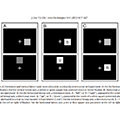Abstract
The congruency sequence effect refers to a reduced congruency effect after incongruent trials relative to congruent trials. This modulation is thought to be, at least in part, due to the control mechanisms resolving conflict. The present study examined the nature of the control mechanisms by having participants perform two different tasks in an alternating way. When participants performed horizontal and vertical Simon tasks in Experiment 1A, and horizontal and vertical spatial Stroop task in Experiment 1B, no congruency sequence effect was obtained between the task congruencies. When the Simon task and spatial Stroop task were performed with different response sets in Experiment 2, no congruency sequence effect was obtained. However, in Experiment 3, in which the participants performed the horizontal Simon and spatial Stroop tasks with an identical response set, a significant congruency sequence effect was obtained between the task congruencies. In Experiment 4, no congruency sequence effect was obtained when participants performed two tasks having different task-irrelevant dimensions with the identical response set. The findings suggest inhibitory processing between the task-irrelevant dimension and response mode after conflict.
